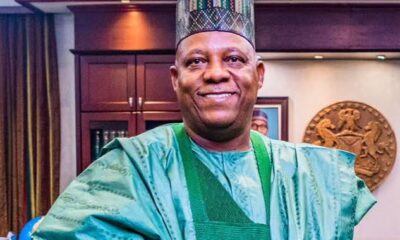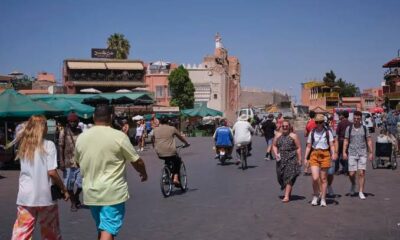Strictly Personal
Malawi’s path to an ‘Award-Winning Judiciary’ By Chidi Odinkalu
Published
1 year agoon

Joyce Banda, Malawi’s fourth (and first female) president, was in Nigeria earlier this month as guest of the Nnamdi Azikiwe University in Awka, Anambra State in South-East Nigeria, where she spoke at the 12th annual lecture in memory of the man after whom the university is named. It was also the 119th birthday of Nnamdi Benjamin Azikiwe, Nigeria’s founding president, and the month of the 26th anniversary of the death in 1997 of Malawi’s founding president.
At the lecture, Joyce Banda described Malawi’s judiciary as “award-winning” and many Nigerians in the audience, embarrassed by the contrast with theirs which wallows in infamy, broke out in spontaneous acclamation. The story of how Malawi’s judges became “award-winning” should be of interest to Nigerians.
On the ruins of the banned Nyasaland African Congress, NAC, Orton Chirwa, Aleke Banda and their confederates, founded the Malawi Congress Party, MCP, in 1959. The previous year, Dr. Akim Kamnkhwala Mtunthama Banda, who would later lead the country to Independence as Dr. Hastings Kamuzu Banda (no relation of Joyce Banda), returned to the brutal embrace of a colonial jail in the country he left on foot in 1915. In the 42 years of his foreign sojourn, Dr. Banda had travelled through many countries and continents, acquiring qualifications in anthropology and qualifying as a medical doctor in both the USA and in the United Kingdom. On his release from jail in June 1960, Orton handed over to Banda the leadership of the MCP.
In 1964, on the sixth anniversary of Banda’s return to the territory, Malawi attained Independence with him as its first prime minister. Orton Chirwa, a graduate, like Nelson Mandela, of Fort Hare University in South Africa, became Attorney-General and Minister of Justice. Two months after the cabinet was sworn in, it was in disarray in a power tussle triggered by allegations of autocracy against Prime Minister Banda.
In many ways, Nigeria’s and Malawi’s trajectories managed to converge and diverge. Six months after the military took over power in Nigeria, Malawi became a Republic in July 1966, with Hastings Banda as its first president. It was also the month of Nigeria’s second military coup.
Orton Chirwa had little regard for the niceties of fair hearing. Prior to Independence, he took issue with the presumption of innocence and burden of proof in criminal trials, arguing for their replacement with traditional African ethos. As Attorney-General he sought these reforms but could not enact them before he was turfed out of cabinet in September 1964.
Following the collapse of the Chilombwe Murder Trials in 1969, Banda scrapped criminal trials by regular courts, transferring jurisdiction over them to so-called Traditional Courts, comprising a traditional chief as chair, with three citizen assessors and one lawyer. As both president and Justice minister, he appointed the traditional courts and they also reported to him. Orton’s ideas had become law.
The Traditional Courts eventually usurped the regular courts, affording to Hastings Banda a perverse veneer of process as they handed to him the heads of a succession of his political opponents in a periodic re-enactment of Biblical blood theatre designed for his macabre amusement.
The three decades of President Banda’s reign accounted for the murder and killing of over 6,000 in a rule described by the Los Angeles Times as characterised by “brutality, nepotism and whim”. The rule of law in the country was reduced to reading the mood swings of the man who would come to be known simply as the “Ngwazi”. As he memorably put it: “Everything. Anything I say is law . . . literally law.”
On Christmas Eve in 1981, Banda arranged to abduct an exiled Orton Chirwa and his wife, Vera, from Zambia and, in a tragic irony, had them arraigned for treason in 1983 before the kind of traditional courts that Orton had advocated for as Attorney-General. Their trial was a charade. The court denied them legal defence and the right to call witnesses. Initially sentenced to death on conviction, Banda commuted this to life imprisonment. Orton spent the remainder of his life in solitary confinement at the Zomba Prison in Malawi where, in December 1992, he died at 73.
In death, Orton exacted revenge on his nemesis. Reputedly born around 1898, Banda’s cognitive capabilities were in terminal decline. On June 12, 1993, Nigeria voted in elections to return the country to democratic rule after a decade of military rule. Two days later, Malawians similarly voted overwhelmingly at the end of tortured advocacy to end single party rule. In Nigeria, the military nullified the vote, extending its rule by another six years. In Malawi, the outcome stood and in elections the following year, citizens toppled Banda’s MCP, replacing him with Bakili Muluzi of the United Democratic Front, UDF.
Under President Muluzi, the country took steps to reinstate the rule of law, reform the Traditional Courts, integrate them into infrastructure of the lower magistracy and update the skills of former traditional court judges through suitable training. In the judiciary, the task of spear-heading this reform then fell upon two young judges: Andrew Nyirenda and Rizine Mzikamanda.
As his tenure wound to an end at the beginning of the millennium, President Muluzi thought himself indispensable and sought to extend his tenure, pitting him in a battle of wits with the judiciary who eventually ruled that being term-limited made him ineligible to run again. In this battle, the judiciary were strengthened by the popular support of citizens wizened by years under the Ngwazi.
In 2004, Professor Bingu wa Mutharika succeeded Muluzi. When Bingu died suddenly of a suspected infarction in April 2012, his younger brother, Peter, an American law professor for over three decades, who was also Foreign Minister, sought to engineer a departure from the constitution in order to by-pass the vice-president, Joyce-Banda, and install himself president.
Despite failing in this machination, Peter inherited his late brother’s political infrastructure and, in 2014, got himself elected president in succession to President Joyce Banda, whose effort to nullify this outcome was foiled by the courts. In 2019, Mutharika sought re-election and, knowing that he lost, got the electoral commission to erase enough results to announce him winner. In February 2020, the Constitutional Court invalidated that declaration.
The year after taking power, in 2015, President Peter Mutharika appointed Justice Andrew Nyirenda as Chief Justice of Malawi. It fell to Nyirenda’s Supreme Court to affirm in May 2020 that the election organised by the president that appointed him as Chief Justice was too flawed to be lawful. On May 8, 2020, they ordered a re-run.
Ahead of national elections in 2019, Nigeria’s President, Muhammadu Buhari compulsorily retired then Chief Justice, Walter Onnoghen, whose fate was buried by the selfish ambitions of his own judicial colleagues.
In Malawi, by contrast, believing that he needed a more pliable court, President Mutharika sought on June 12, 2020 to oust Chief Justice Nyirenda and his next in line, Justice Edward Twea. In response, Malawi’s citizens blockaded the streets and the courts restrained a desperate president. Two weeks later, the citizens delivered the coup de grace, ousting President Mutharika in the re-run. When he retired in 2021 as Chief Justice, Andrew Nyirenda became a judge of the IMF Administrative Tribunal. His successor as the Chief was Rizine Mzikamanda.
In Malawi, citizens learned the hard way that the judiciary is ordinarily a weapon in the hands of the powerful; that judges are not born independent; and that judicial independence is fought for not donated.
Courts and the judges who sit in them are liable to suffer elite weaponisation in any country in which citizens are unwilling to provide judges with the political support to enable them to strategically defect from the status quo.
Malawi’s politicians, having learnt that this kind of judiciary endangers them all, have become reluctant converts to judicial independence. Trading in short-term control for long-term security of expectation, they seek and appoint the best to be judges.
In Nigeria, by contrast, subsistence remains the cause of politics; so politicians weaponise the judiciary in advancing a jurisprudence of subsistence. Citizens interested in changing this could profit from a study of how Malawi changed it.
You may like
-


‘Don’t start what you can’t finish’, ex-Nigerian official replies President Tchiani
-


Again, Starlink raises prices of its services in Nigeria
-


Niger citizen knocks President Tchiani for neglecting critical issues at home to peddle rumours against Nigeria
-


Dumping England for Nigeria the best decision of my life— Ademola Lookman
-


Nigeria resumes mining in Zamfara state
-


Nigeria’s future is very bright, we’ll overcome challenges, VP Shettima says
Strictly Personal
Let’s merge EAC and Igad, By Nuur Mohamud Sheekh
Published
1 month agoon
November 27, 2024
In an era of political and economic uncertainty, global crises and diminishing donor contributions, Africa’s regional economic communities (RECs) must reimagine their approach to regional integration.
The East African Community (EAC) and the Intergovernmental Authority on Development (Igad), two critical RECs in East Africa and the Horn of Africa have an unprecedented opportunity to join forces, leveraging their respective strengths to drive sustainable peace and development and advance regional economic integration and promote the African Continental Free Trade Area (AfCFTA).
Already, four of the eight Igad member states are also members of the EAC and, with Ethiopia and Sudan showing interest, the new unified bloc would be formidable.
Igad’s strength lies in regional peacemaking, preventive diplomacy, security, and resilience, especially in a region plagued by protracted conflicts, climate challenges, and humanitarian crises. The EAC, on the other hand, has made remarkable strides in economic integration, exemplified by its Customs Union, Common Market, and ongoing efforts toward a monetary union. Combining these comparative advantages would create a formidable entity capable of addressing complex challenges holistically.
Imagine a REC that pairs Igad’s conflict resolution strengths with the EAC’s diplomatic standing and robust economic framework. Member states of both are also contributing troops to peacekeeping missions. Such a fusion would streamline efforts to create a peaceful and economically prosperous region, addressing the root causes of instability while simultaneously promoting trade investment and regional cooperation.
These strengths will be harnessed to deal with inter-state tensions that we are currently witnessing, including between Ethiopia and Somalia over the Somaliland MoU, strained relations between Djibouti and Eritrea, and the continually deteriorating relations between Eritrea and Ethiopia.
The global economy experienced as a result of the COVID-19 pandemic, compounded by the Ukraine war and competing global crises, has strained donor countries and reduced financial contributions to multilateral organisations and African RECs. Member states, many of which are grappling with fiscal constraints, are increasingly unable to fill this gap, failing to make timely contributions, which is in turn affecting key mandate areas of Igad and EAC, and staff morale.
A merger between Igad and EAC would alleviate this financial pressure by eliminating redundancies. Shared administrative systems, integrated programmes, and a unified leadership structure would optimise resources, enabling the new REC to achieve more with less. Staff rationalisation, while sensitive, is a necessary step to ensure that limited funds are channelled toward impactful initiatives rather than duplicative overheads.
The African Union (AU) envisions a fully integrated Africa, with RECs serving as the building blocks of the AfCFTA. A unified EAC-Igad entity would become a powerhouse for regional integration, unlocking economies of scale and harmonising policies across a wider geographical and economic landscape.
This merger would enhance the implementation of the AfCFTA by creating a larger, more cohesive market that attracts investment, fosters innovation, and increases competitiveness. By aligning trade policies, infrastructure projects, and regulatory frameworks, the new REC could serve as a model for others, accelerating continental integration.
The road to integration is not without obstacles. Political will, divergent institutional mandates, and the complexity of harmonising systems pose significant challenges. However, these hurdles are surmountable through inclusive dialogue, strong leadership, and a phased approach to integration.
Member states must prioritise the long-term benefits of unity over short-term political considerations. Civil society, the private sector, the youth, and international partners also have a critical role to play in advocating for and supporting this transformative initiative.
The time for EAC and Igad to join forces is now. By merging into a single REC, they would pool their strengths, optimise resources, and position themselves as a driving force for regional and continental integration. In doing so, they would not only secure a prosperous future for their citizens and member states but also advance the broader vision of an integrated and thriving Africa.
As the world grapples with crises, Africa must look inward, embracing the power of unity to achieve its potential. A combined Igad-EAC is the bold step forward that the continent needs.
Nuur Mohamud Sheekh, a diplomatic and geopolitical analyst based in London, is a former spokesperson of the Igad Executive Secretary. X: @NuursViews
Strictly Personal
Budgets, budgeting and budget financing, By Sheriffdeen A. Tella, Ph.D.
Published
1 month agoon
November 20, 2024
The budget season is here again. It is an institutional and desirable annual ritual. Revenue collection and spending at the federal, State and local government levels must be authorised and guided by law. That is what budget is all about. A document containing the estimates of projected revenues from identified sources and the proposed expenditure for different sectors in the appropriate level of government. The last two weeks have seen the delivery of budget drafts to various Houses of Assembly and the promise that the federal government would present its draft budget to the National Assembly.
Do people still look forward to the budget presentation and the contents therein? I am not sure. Citizens have realised that these days, governments often spend money without reference to the approved budget. A governor can just wake up and direct that a police station be built in a location. With no allocation in the budget, the station will be completed in three months. The President can direct from his bathroom that 72 trailers of maize be distributed to the 36 states as palliatives. No budget provision, and no discussion by relevant committee or group.
We still operate with the military mentality. We operated too long under the military and of the five Presidents we have in this democracy, two of them were retired military Heads of State. Between them, they spent 16 years of 25 years of democratic governance. Hopefully, we are done with them physically but not mentally. Most present governors grew up largely under military regimes with the command system. That is why some see themselves as emperor and act accordingly. Their direct staff and commissioners are “Yes” men and women. There is need for disorientation.
The importance of budget in the art of governance cannot be overemphasized. It is one of the major functions of the legislature because without the consideration and authorisation of spending of funds by this arm of government, the executive has no power to start spending money. There is what we refer to as a budget cycle or stages. The budget drafting stage within the purview of the executive arm is the first stage and, followed by the authorisation stage where the legislature discusses, evaluates and tinkers with the draft for approval before presenting it to the President for his signature.
Thereafter, the budget enters the execution phase or cycle where programmes and projects are executed by the executive arm with the legislature carrying out oversight functions. Finally, we enter the auditing phase when the federal and State Auditors verify and report on the execution of the budgets. The report would normally be submitted to the Legislature. Many Auditor Generals have fallen victim at this stage for daring to query the executives on some aspects of the execution in their reports.
A new budget should contain the objectives and achievements of the preceding budget in the introduction as the foundation for the budget. More appropriately, a current budget derives its strength from a medium-term framework which also derives its strength from a national Development Plan or a State Plan. An approved National Plan does not exist currently, although the Plan launched by the Muhammadu Buhari administration is in the cooler. President Tinubu, who is acclaimed to be the architect of the Lagos State long-term Plan seems curiously, disillusioned with a national Plan.
Some States like Oyo and Kaduna, have long-term Plans that serve as the source of their annual budgets. Economists and policymakers see development plans as instruments of salvation for developing countries. Mike Obadan, the former Director General of the moribund Nigeria Centre for Economic and Management Administration, opined that a Plan in a developing country serves as an instrument to eradicate poverty, achieve high rates of economic growth and promote economic and social development.
The Nigerian development plans were on course until the adoption of the World Bank/IMF-inspired Structural Adjustment Programme in 1986 when the country and others that adopted the programme were forced to abandon such plan for short-term stabilisation policies in the name of a rolling plan. We have been rolling in the mud since that time. One is not surprised that the Tinubu administration is not looking at the Buhari Development Plan since the government is World Bank/IMF compliant. It was in the news last week that our President is an American asset and by extension, Nigeria’s policies must be defined by America which controls the Bretton Woods institutions.
A national Plan allows the citizens to monitor quantitatively, the projects and programmes being executed or to be executed by the government through the budgeting procedure. It is part of the definitive measures of transparency and accountability which most Nigerian governments do not cherish. So, you cannot pin your government down to anything.
Budgets these days hardly contain budget performance in terms of revenue, expenditure and other achievements like several schools, hospitals, small-scale enterprises, etc, that the government got involved in successfully and partially. These are the foundation for a new budget like items brought forward in accounting documents. The new budget should state the new reforms or transformations that would be taking place. Reforms like shifting from dominance of recurrent expenditure to capital expenditure; moving from the provision of basic needs programmes to industrialisation, and from reliance on foreign loans to dependence on domestic fund mobilisation for executing the budget.
That brings us to the issue of budget deficit and borrowing. When an economy is in recession, expansionary fiscal policy is recommended. That is, the government will need to spend more than it receives to pump prime the economy. If this is taken, Nigeria has always had a deficit budget, implying that we are always in economic recession. The fact is that even when we had a surplus in our balance of payment that made it possible to pay off our debts, we still had a deficit budget. We are so used to borrowing at the national level that stopping it will look like the collapse of the Nigerian state. The States have also followed the trend. Ordinarily, since States are largely dependent on the federal government for funds, they should promote balanced budget.
The States are like a schoolboy who depends on his parents for school fees and feeding allowance but goes about borrowing from classmates. Definitely, it is the parents that will surely pay the debt. The debt forgiveness mentality plays a major role in the process. Having enjoyed debt forgiveness in the past, the federal government is always in the credit market and does not caution the State governments in participating in the market. Our Presidents don’t feel ashamed when they are begging for debt forgiveness in international forum where issues on global development are being discussed. Not less than twice I have watched the countenance of some Presidents, even from Africa, while they looked at our president with disdain when issues of debt forgiveness for African countries was raised.
In most cases, the government, both at the federal and state cannot show the product of loans, except those lent by institutions like the World Bank or African Development Bank for specific projects which are monitored by the lending institutions. In other cases, the loans are stolen and transferred abroad while we are paying the loans. In some other cases, the loans are diverted to projects other than what the proposal stated. There was a case of loans obtained based on establishing an international car park in the border of the State but diverted to finance the election of a politician in the State. The politician eventually lost the election but the citizens of the State have to be taxed to pay the loan. Somebody as “Nigeria we hail thee”.
Transformation in budgeting should commence subsequently at the State and federal level. Now that local government will enjoy some financial autonomy and therefore budgeting process, they should be legally barred from contracting foreign loans. They have no business participating in the market. They should promote balanced budget where proposed expenditures must equal the expected revenues from federal and internal sources. The State government that cannot mobilise, from records, up to 40 percent of its total budget from IGR should not be supported to contract foreign loans. The States should engage in a balanced budget. The federal government budget should shift away from huge allocations to recurrent expenditure towards capital expenditure for capital formation and within the context of a welfarist state.
Sheriffdeen A. Tella, Ph.D.
EDITOR’S PICK


‘Don’t start what you can’t finish’, ex-Nigerian official replies President Tchiani
Former Nigerian Aviation Minister, Femi Fani-Kayode, has told President Abdourahamane Tchiani of Niger Republic to refrain from making infantile and...


Again, Starlink raises prices of its services in Nigeria
Elon Musk’s satellite internet service provider, Starlink, has again jacked up the prices of its services in Nigeria after an...


Former President of Moroccan club Raja sentenced to 3 years in prison
The former President of Moroccan top club, Raja Casablanca, Mohamed Aouzal, has been sentenced to three and a half years...


Zambia announces second case of Mpox as country battles cholera outbreak
The Zambian Ministry of Health has reported a second case of Monkeypox, popularly known as Mpox, in Kitwe region of...


Obama names three African artistes in his Favorite Music list 2024
In keeping with the tradition of naming his favourite music list of the year, former United States President, Barack Obama,...


NCAS President confirms Nigerians killed extrajudicially in South Africa in 2024
The President of the Nigerian Citizens Association in South Africa (NCAS), Frank Onyewekelu, has confirmed that at least 20 Nigerians...


Niger citizen knocks President Tchiani for neglecting critical issues at home to peddle rumours against Nigeria
A citizen of Niger Republic has slammed the country’s military leader, President Abdourahmane Tchiani, for neglecting critical issues facing the...


Moroccan tourist arrivals hit record-breaking 16 million
The year 2024 has seen Morocco celebrate a record-breaking 16 million tourist arrivals, surpassing the 12 million mark set in...


Safaricom Ethiopia launches 4G network in Gambella
Ethiopia’s second largest telecom provider, Safaricom Telecommunications Ethiopia P.L.C., has announced the official launching of its 4G network services in...


Dumping England for Nigeria the best decision of my life— Ademola Lookman
Current African Men’s Footballer of the Year, Ademola Lookman, has attributed his rise in the football echelon to his decision...


